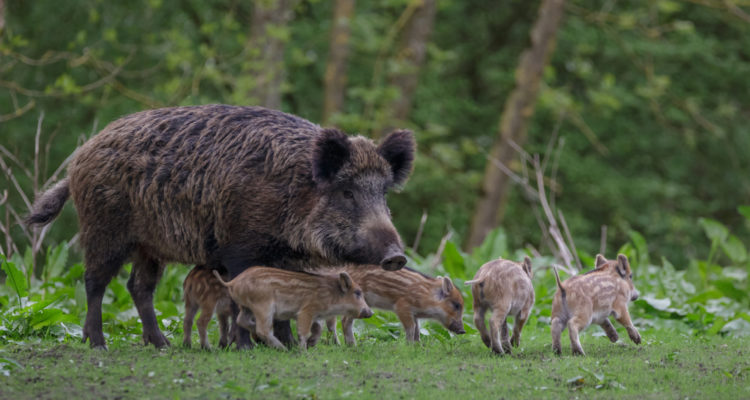Haifa’s wild boar population explodes, creating a nightmare scenario for residents of the northern city.
By Lauren Marcus, World Israel News
During the coronavirus lockdown, Israelis were treated to a number of local news stories about wildlife returning to urban areas throughout the Jewish state. Ibexes meandered on the Eilat boardwalk, jackals roamed Tel Aviv’s HaYarkon Park, and Haifa’s streets were overrun by wild boars.
While many find the images of wild boars gallivanting through Haifa amusing, the reality is that the animals pose major risks to the residents.
Residents report that the boars overturn garbage cans, destroy gardens, endanger drivers when they cross roads, and sometimes physically attack humans. Their presence has been a nuisance for residents of Haifa for years.
But it wasn’t just the lack of people in the streets during the lockdowns that emboldened the boars. Their population has swelled in the last two years, and it’s thought that the boars are taking advantage of safety in numbers.
Yona Yahav, who served as Haifa’s mayor from 2003 to 2018, permitted hunts of the boars, which kept their population at a manageable level.
But Dr. Einat Kalisch-Rotem, who defeated Yahav in the 2018 municipal election and now serves as mayor of Haifa, banned boar hunting when she took office as part of her environmentally friendly platform.
Kalisch-Rotem said the hunting method was ineffective and other methods for population control should be explored.
Speaking to Israel Hayom, a resident of the Camellia neighborhood disagreed with the new policy. “The city’s argument that the hunting was ineffective is wrong,” the resident said.
“The situation is getting worse minute by minute, and the boars are getting more and more bold. It happened the minute the hunting stopped. We’ve been warning the city about it for over a year. Every sow has 12 piglets, twice a year. So a hundred female boars give birth to 2,400 piglets a year.”
“That’s what we’re seeing on the streets now – entire herds.”
Eitan Orliev told Israel Hayom about his dangerous encounter with a wild boar in Haifa’s Ramat Shaul neighborhood.
“A few months ago, I returned home from work. I got out of the car, walked toward the driveway, heard a noise, and from about 10 meters away, a giant boar began to gallop in my direction.”
The boar rammed Orliev. “My leg was broken in five places. I was on the ground and couldn’t even scream. My wife found me on the ground, passed out.”
“I had to have surgery and pins put in my leg. I was bed bound for three months, then went through months of physical therapy. I had to leave where the attack happened because I felt anxious constantly. We had to move to another neighborhood.”
Yocheved Levy, a resident of the Upper Hadar neighborhood, told Israel Hayom that the boars had negatively affected her quality of life. “They’re always outside my door. If I’m returning home, I can’t go inside. If I’m inside, I can’t leave.”
“I feel like a prisoner in my own home. This is mentally stressful. I’m scared.”
At a Haifa council meeting yesterday, local politician Yitzhak Balas spoke out about the boar crisis. “We have become a laughingstock of the entire country,” he said.
“Haifa has become known as the ‘pig town.’ Reduce the boar population like we did in the past, or transport them in trucks to the Golan Heights. Anyone who has a problem with this is welcome to [adopt] a boar and raise it in his own home.”
In a statement, the Haifa Municipality responded, “Haifa, like other cities in Israel and the world bordering natural areas, is grappling with wildlife invading the city in search of food sources.”
“In recent years, the municipality has dealt with the issue through hunting, which was found to be ineffective and dangerous because the hunts were carried out near residents’ homes.”
“The municipality is aware of the nuisance and acts to remove wild boars in collaboration with all professional bodies, including the Nature and Parks Authority.”




